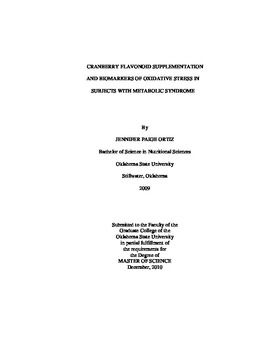| dc.contributor.advisor | Basu, Arpita | |
| dc.contributor.author | Ortiz, Jennifer Paige | |
| dc.date.accessioned | 2014-04-15T22:01:25Z | |
| dc.date.available | 2014-04-15T22:01:25Z | |
| dc.date.issued | 2010-12-01 | |
| dc.identifier.uri | https://hdl.handle.net/11244/9257 | |
| dc.description.abstract | Metabolic syndrome (MeS), a collection of risk factors including dyslipidemia, hypertension, visceral adiposity, and hyperglycemia, is also a condition associated with increased oxidative stress and CVD risk. Cranberry flavonoids, such as those present in cranberry juice, are potent antioxidants. The objective of this randomized crossover controlled trial was to analyze any difference in features of MeS and biomarkers of oxidative stress including OxLDL and MPO, in subjects following a 4-week intervention of low calorie cranberry juice in comparison to controls. 10 subjects with MeS were recruited and randomized to either cranberry group (2 cups of cranberry juice/day) or control group (2 cups of flavored juice/day) in a crossover design with a two week washout period. Anthropometrics, blood pressure and blood draws were obtained at screen as well as at the end of each intervention period. From blood draws, lipid profiles, oxidized LDL and myeloperoxidase (MPO) were determined. Subjects were asked maintain 3-day food records. Repeated measures ANOVA were performed to detect differences between groups at each intervention period with statistical significance set and 0.05. Significant reductions were observed in HDL as well as systolic and diastolic blood pressures following low calorie cranberry juice intervention compared to baseline. Additionally, a significant increase in blood glucose was observed following low calorie cranberry juice intervention compared to baseline. No significant differences were observed in biomarkers of oxidative stress including OxLDL and MPO. The results of the present study do not suggest that short term low calorie cranberry juice supplementation positively effects oxidative stress in subjects with metabolic syndrome. However, the present study was a pilot study and further research should be conducted to examine the efficacy of low calorie cranberry juice at positively modifying CVD risk factors including blood pressure and lipid profiles. | |
| dc.format | application/pdf | |
| dc.language | en_US | |
| dc.publisher | Oklahoma State University | |
| dc.rights | Copyright is held by the author who has granted the Oklahoma State University Library the non-exclusive right to share this material in its institutional repository. Contact Digital Library Services at lib-dls@okstate.edu or 405-744-9161 for the permission policy on the use, reproduction or distribution of this material. | |
| dc.title | Cranberry Flavonoid Supplementation and Biomarkers of Oxidative Stress in Subjects with Metabolic Syndrome | |
| dc.type | text | |
| dc.contributor.committeeMember | Betts, Nancy M. | |
| dc.contributor.committeeMember | Lucas, Edralin | |
| osu.filename | Ortiz_okstate_0664M_11157.pdf | |
| osu.college | Human Environmental Sciences | |
| osu.accesstype | Open Access | |
| dc.description.department | Department of Nutritional Sciences | |
| dc.type.genre | Thesis | |
| dc.subject.keywords | cranberry flavonoid | |
| dc.subject.keywords | cranberry juice | |
| dc.subject.keywords | metabolic syndrome | |
| dc.subject.keywords | myeloperoxidase | |
| dc.subject.keywords | oxidative stress | |
| dc.subject.keywords | oxidized ldl | |
